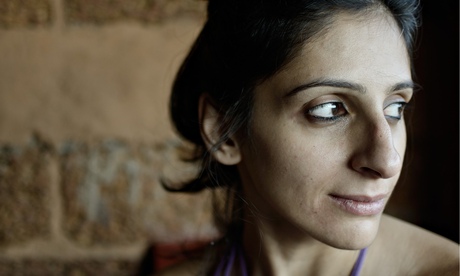
Delhi, Montana, northern England: a new batch of noteworthy debut novels proves as varied as its backdrops, telling stories filled with tension, comedy and risky passion.
Katherine Faw Morris's churning Young God (Granta, £12.99) opens as Nikki, who seems older than any 13-year-old girl ever should, dives from a cliff into a swimming hole 80 feet below. For the reader, getting sucked into the ensuing story of drugs, vice and murder is a similarly daredevil thrill.
Nikki's voice is both innocent and jaded, conjuring up a backwoods world of "witch-tit freezing" rivers and mountains that "crawl like a slow blue animal". It's a landscape that, in literary terms, backs directly on to Daniel Woodrell's Winter's Bone.
The best buds at the centre of Emily Gould's Friendship (Virago, £14.99) live a world away in New York City. Or rather, NYC as they once dreamt it. But with their 20s petering out, reality is creeping up on Bev and Amy like dawn at a music festival. An unplanned pregnancy belatedly hauls them toward adulthood and also forces a re-evaluation of their bond.
Beneath Gould's breezy apercus on millennials and social media there lurks a sharp study of female friendship, that treacherous terrain in which envy and deep fondness often go hand in hand.
If Amy and Bev think they have it bad, they should meet Anna, whose lot Alina Simone skewers in Note to Self (Fourth Estate, £11.99). At 37, Anna is newly fired and paralysed by "an orchestra of ticking clocks". She's also addicted to the internet, to the extent that she fantasises about strangers' bulging inboxes. Her quest for redemption leads her into the clutches of a guru-like film-maker, allowing Simone to spin a determined satire on art and self-absorption.
Annihilating desire laps at the edges of Deepti Kapoor's A Bad Character (Cape, £14.99), whose narrator, Idha, looks back on troubled first love from the distance of a decade. When she meets the man who will shape her destiny, she is 20, attending college in Delhi while being escorted to "marriage meetings" by the aunt with whom she lives. Her seducer is older, scandalously darker skinned, and has an accent that bears traces of years spent in New York. As he exposes the city's underbelly for her, the way home becomes increasingly inaccessible.
This slender, mysterious and only fleetingly overwrought novel offers vivid insights into what it means to be a middle-class woman in 21st-century Delhi.
Meanwhile, in northern England, Claire has fallen in love, converted to Mormonism and is already pregnant by the time she graduates. Carys Bray's novel A Song for Issy Bradley (Hutchinson, £12.99) describes what happens years later, when the loss of Claire's youngest child threatens her faith and her family's unity.
It feels like a novel concocted in a creative writing workshop – carefully conceived but oddly bloodless – which is a shame since its roots are powerfully autobiographical. Nevertheless, the backdrop – a small town clinging to a perilous stretch of coast near Blackpool – is lingeringly realised, and despite some jerky dialogue, Claire and her husband eventually attain a persuasive humanity.
A child's return drives Remember Me Like This (Two Roads, £17.99), Bret Anthony Johnston's novel about Justin Campbell, who vanishes from a Texan town, aged 11, and is miraculously found just miles away four years later.
Johnston has an ear for tidy phrases that pinpoint the elegiac in ho-hum domesticity, noting how blinds "ladder" light on to a bedspread or how, looking at Justin's sad father, an elderly widow would "like to sop him up with a biscuit". It's a suspenseful, uplifting portrait of a family in crisis.
Former ad man Smith Henderson sets his debut, Fourth of July Creek (Heinemann, £16.99), in Montana, in the early 1980s, where social worker Pete Snow becomes entangled with Jeremiah Pearl, a survivalist whose 11-year-old son is dangerously neglected. All is far from well in Pete's own home, however. With his marriage in tatters, his wife takes their 13-year-old daughter to live in Texas. When the girl then runs away, Pete searches the country for her, repressing all that his job has taught him about her likely fate. Meanwhile, Jeremiah has caught the attention of the FBI.
Listen out for echoes of Richards Russo and Ford as Henderson powers his way to an abruptly devastating ending.

